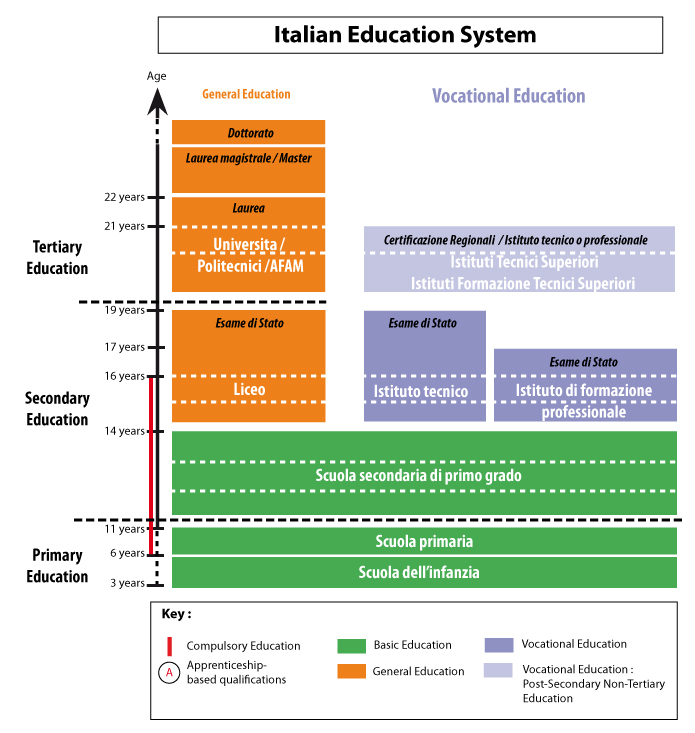The Italian higher educationeducationTeacher education or teacher training refers to the policies, procedures, and provision designed to equip (prospective) teachers with the knowledge, attitudes, behaviors, approaches, methodologies and skills they require to perform their tasks effectively in the classroom, school, and wider community.https://en.wikipedia.org › wiki › Teacher_educationTeacher education – Wikipedia system is a binary system, divided into two large sectors or compartments, institutionally and functionally different: the University sector and the Higher Education for Fine Arts, Music and Dance sector, known succinctly as the AFAM sector.
How do universities work in Italy?
The Italian university system is organised in three cycles, according to the Bologna structure: the main academic degrees are the Laurea (1st cycle), the Laurea Magistrale (2nd cycle) and the Dottorato di Ricerca (3rd cycle). The system also offers other study programmes and related qualifications.
How does Italy’s education system work?
Education in Italy is free and is compulsory for children aged between 6 and 16 years. The Italian education system is divided into nursery, kindergarten, elementary school, middle school, and high school. University is usually undertaken at the age of 19. Primary education is the first stage of compulsory education.
What is a bachelor’s degree called in Italy?
The bachelor’s degree equivalent is called “Laurea” in Italy. It’s actually the qualification equivalent to a Bachelor of Science in the university system; an undergraduate degree you earn after 3 years of study.
How do universities work in Italy?
The Italian university system is organised in three cycles, according to the Bologna structure: the main academic degrees are the Laurea (1st cycle), the Laurea Magistrale (2nd cycle) and the Dottorato di Ricerca (3rd cycle). The system also offers other study programmes and related qualifications.
How long is a university semester in Italy?
How many semesters does university of Italy have?
The academic year in Italy is made up of two semesters. The first semester starts in September/October and ends in January/February. The second semester starts in February and ends in July.
Do Italian students have homework every night?
According to research conducted by the OECD, 15-year old children in Italy have to contend with just under 9 hours of homework every week, more than anywhere else in the world.
Is university free for Italian citizens?
Alternatively, college tuition in many European countries is completely free or nationals and students of the EU. When you’re an Italian citizen, you can enroll in any EU university as any other Italian national would.
How long is a college day in Italy?
A typical school day in Italy starts around 8am and ends around 1:30pm. The students have 5 hours of classes and a lunch break. Italians have full school days on Saturdays, too. The most overwhelming difference between American and Italian schools is their method of academic evaluations.
What is a master’s degree called in Italian?
The undergraduate degree is called ‘Laurea’, the postgraduate degree is ‘Laurea Magistrale’, and the doctoral degree is called ‘Dottorato di Ricerca’. To be safe, best review the degrees at your chosen university before beginning your Masters study in Italy.
What age does university start in Italy?
Students typically enter university at age 19 in Italy, one year later than in most EU countries. Following the Bologna harmonization process, universities are organized in a first cycle of 3 years (BA), followed by a 2-year secondary cycle of two years (MA).
Do I need to speak Italian to study in Italy?
All non-EU students looking to study in a programme in Italian, must show proof of a B2 Italian language level. To do so, several Italian language certifications are available, which are issued by universities, cultural institutions and certified language schools in Italy and worldwide.
How long is a bachelor degree in Italy?
Bachelor’s degree structure in Italy The duration of study depends on the course taken, with medicine taking at least six years and law five years. Aside from these exceptions, the typical duration of a bachelor degree in Italy is three or four years.
Is it easy to get into Italian universities?
There are general eligibility requirements for admission into a recognized institution in Italy and they include; Hold a foreign high-school diploma/bachelor degree (for graduate students) that proves that you qualify for university education in Italy with a minimum of 59% in your last two years of study.
Do universities in Italy teach in English?
Most courses are taught in Italian, but some courses can be found in English. They also offer Italian language courses for non-native speakers.
Is university in Italy free for international students?
Free Education in Italy for International Students Every student questions “does Italy offer free education?” The simple answer is yes, Italy offers free education to International students. Italian Universities are a popular choice amongst students who wish to study without spending much.
How much does university cost in Italy?
How do universities work in Italy?
The Italian university system is organised in three cycles, according to the Bologna structure: the main academic degrees are the Laurea (1st cycle), the Laurea Magistrale (2nd cycle) and the Dottorato di Ricerca (3rd cycle). The system also offers other study programmes and related qualifications.
Is studying in Italy worth it?
Italy is an affordable destination for international students. Italy is one of the most affordable countries in Europe where you can study abroad and that goes for tuition fees and living costs as well. You can also check out the Studyportals Scholarship to get some help on financing your studies in Italy.
Is Italy’s education system good?
How many intakes do Italian universities have?
There are two intakes for admission to Italian universities. Students can choose the intake based on the time when they are applying, the course they want, the availability of seats at your preferred college/university.









